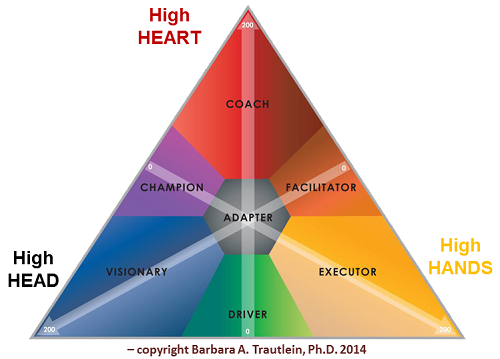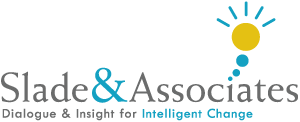When you walk in the room, who shows up for Read more →
Change Intelligence Quotient
Posted Friday, December 5, 2014Given that 70% of large scale changes fail, we need to slant the odds in favor of success. We need better leadership for change.
So, what makes someone good at leading change? Articulating the vision for the change? Connecting with people in the trenches of change? Technical skills, such as project management or design? And, the answer is . . .
[drum roll]
. . . Yes!
Barbara Trautlein’s research on Change Intelligence: Using the Power of CQ to Lead Change that Sticks suggests three key dimensions to leading change: head, hands and heart.
Head-oriented leaders focus on the long term vision. They are strategic and purpose-oriented, adept at inspiring others toward the bright new future.
Heart-oriented leaders help engage and care for others in the midst of change. They are motivational and supportive coaches.
Hands-oriented leaders make the change happen on time, to budget and to specifications. They plan the work and then work the plan.
Some change leaders are laser focused on just one of the three – head, heart or hands. Other leaders blend two of the perspectives. And, adapters have a balance of head, heart and hands. Taking all the possibilities, there are seven styles of change intelligence.

So, which style is best? Like many things in life, leadership and organizational effectiveness, the answer depends on the situation.
Sometimes a coach engages the heart, but needs a driver to get stuff done.
A visionary may trigger the change while a facilitator is needed to bring people and tasks to the successful end point.
An executor can manage the project details but may need a champion to create the vision and provide the heart to engage people in the long term vision.
And, do not think the adapter is somehow the perfect blend. My style is adapter, leaning toward driver. While my flexibility is valuable in many change environments, sometimes I confuse people by seeming mercurial.
In other words, all seven styles have advantages and drawbacks. What matters is knowing yourself and others, then combining styles and adjusting to the situation to maximize the odds of success for your change efforts. Trautlein calls ability CQ:
CQ (or Change Intelligence) is the awareness of one’s own Change Leader Style, and the ability to adapt one’s style to be optimally effective in leading change across a variety of people and situations.I am on record saying that emotional intelligence is dumb. Why would I write about change intelligence?
Emotional intelligence (or EQ) implies an ability. There is a high and a low, and the high is obviously better. The problem I see is the implication that EQ imposes some upper limit on a leaders emotional capabilities. I prefer to talk about managing emotions, since that is something all leaders can master.
CQ is built on the appreciation of three change leadership focal points – head, heart and hands. There is no judgment implied that one is superior. All three focal points are essential. All seven styles are valuable.
Over the next few weeks, I will be blogging about each of the seven CQ styles – the good things as well as the pitfalls and pratfalls that each style can pose for change leaders. My intent is to use change intelligence to help you know yourself better and to know the other people facing change.
Bottom line: Know yourself, know the people around you and know what challenges you face in a change project. That trick, that knowledge, is a powerful step toward dialogue and insight for intelligent change.



Pingback: Change Intelligence: Coaches and Drivers
Intriguing tripartite approach to managing change. Outstanding graphic model.
Is this a new niche in your consulting practice?
Hope all is well with you and your family and that you all have a Merry Christmas.
Ray J
Ray,
Great to hear from you!
Yes, my consulting and coaching focuses on change for leaders and for organizations. I continue to teach at William & Mary as an adjunct.
Pingback: Change Intelligence: Visionaries and Facilitators
Pingback: Change Intelligence: Executors and Champions
Pingback: Change Intelligence: Adapters